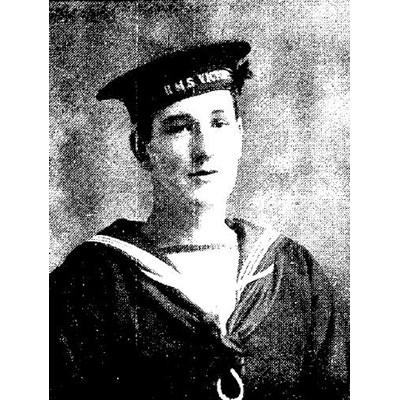MacDougall, Stewart Dunsmore Z/2087 (1897 - 1918)

Signaller, Royal Naval Volunteer Reserve, HMS "Iris II"
Buried at Cathcart Cemetery
Commemorated at Hillhead High School
Stewart Dunsmore MacDougall was the elder son of Mr. James H. and Mrs. MacDougall, 11 Strathmore Gardens. He was educated at Brookfield School, Cumberland, and at Hillhead High School. Like many more Hillhead High School boys, he joined the Boy Scouts at the beginning of the movement, and was one of the most efficient members of the signalling section of the First Glasgow Troop.
He was passionately fond of outdoor life, and the call of the sea and the prairie came to him early. When only fifteen years of age he joined the Clyde Division of the R.N.V.R., and continued an active member of it up to the beginning of the war.
In the summer of 1914 the opportunity he was looking for of embarking on a Colonial career came to him through an uncle in British Columbia. His kit was ready and his passage booked for the 16th August, 1914. Then came the opening of Armageddon, and he was mobilised with others of the Clyde Division, and incorporated in the Hood Battalion, Naval Brigade. When Volunteers were invited for the
Antwerp expedition he at once came forward, and received his baptism of fire in that misguided venture.
After a course of training as a signaller he was sent to Portsmouth Breakwater on boom defence work, where he remained for nearly two years. He was then transferred to the "Boxer", and was on board when she went to the bottom as the result of a collision.
While in Portsmouth awaiting orders after this mishap, he volunteered for the Zeebrugge expedition which was fixed for 23rd April, 1918. Stewart was of the true Nelson breed, for hardly had he escaped from one peril when he comes forward of his own accord to share in a still greater one. He was posted to the "Iris" as signaller, and had a strenuous time rehearsing for the great adventure.
One of his comrades writes, "Two or three days before 'the stunt' came off the commander, Captain Valentine Gibbs, sent for Stewart, and, in the presence of the whole ship's company, presented him with the Mons Ribbon for being one of the Naval Brigade that took part in the defence of Antwerp. It is pleasing to think of the gallant Stewart sailing away on his last voyage with this ribbon on his breast. The rest of the story belongs to history. The "Iris" completed her mission, in spite of a tornado of shot and shell, but just as she was leaving the Mole a shell exploded on the bridge, killing the gallant Captain Valentine Gibbs and his no less heroic signaller.




